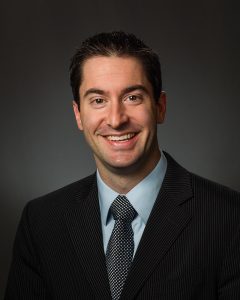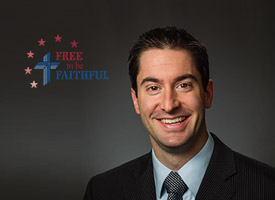By Adriane Heins
Should LCMS pastors continue to perform the marriage rite for heterosexual couples in LCMS congregations, in light of the U.S. Supreme Court’s June 26 ruling that same-sex couples have the right to marry in any state in the country?

Jim Campbell — senior legal counsel with Alliance Defending Freedom, Center for Marriage and Family director and key litigator in high-profile cases across the nation — has a quick answer to that question: “We think that churches and people of faith and Christians should continue to do that. Why? Because Christians shouldn’t abandon the field.”
On July 14, Campbell gave that answer as he offered insight into the Supreme Court’s marriage ruling via a webinar hosted by “Free to be Faithful,” the Synod’s education and awareness initiative regarding marriage, life and religious liberty.
During the webinar, he also urged pastors and congregations to put their marriage policies in writing and to do so in the most specific way possible.
“The more restrictions that a specific church has on weddings, the easier it is to access legal protection,” he noted, stating that a congregation’s documents regarding marriage will be useful “in defending against a potential attack that could come down the road.”
Redefinition of marriage
Campbell spoke briefly regarding the court’s decision to legalize same-sex marriage nationwide, explaining, “Before the court’s decision, when the Supreme Court has attempted to determine and define fundamental rights, it has always looked to the history and tradition of this nation.” In this case, however, he believes the court arbitrarily determined that history and tradition “don’t set the boundaries of these fundamental rights.”
As a result, Campbell said, the court “discussed the right to marry in a high level of abstraction,” which has caused Alliance Defending Freedom and millions of Americans to be “very worried about the future of religious liberty.”
Still, Campbell encouraged Christians not to give up or lose hope, encouraging them to “winsomely and yet boldly and persuasively [communicate] our views on marriage.”
“Some people may think that now that the court has decided, the debate on marriage is over,” he noted. But continuing to speak about marriage in the public square helps those with opposing views to see that “there is a rational, reasonable faith-based basis for our views,” he said.
What’s to come
Campbell also spent a few moments pointing to future issues that may result from the Supreme Court’s ruling, namely an adverse impact on faith-based adoption and foster agencies.
“In the District of Columbia, in Massachusetts, in Illinois, soon after [their] redefinition of marriage … we saw faith-based adoption and foster agencies driven out of that work in those jurisdictions so it’s reasonable to think that could occur now in all the states and jurisdictions,” he said.
Churches and other religious organizations also may one day lose their tax-exempt status, Campbell noted. “Justice Alito referenced this issue in the oral argument: ‘If we redefine marriage as a constitutional matter, what will be the impact on the tax-exempt status of religious organizations that continue to believe that marriage is the union of a man and a woman and continue to oppose same-sex marriage?’ ”
The response from the solicitor general, according to Campbell, was simple: “That is going to be an issue. I don’t deny that.”
Finally, Campbell foresees a negative impact on licensed professionals — counselors, lawyers, doctors and the like. “We’re concerned that if they operate consistent with their religious beliefs on marriage, they may face issues with future licensing,” he said, recounting the story of a counselor who was removed from her job for refusing to provide relationship counseling to a same-sex couple.
Speak the truth
Still, Campbell doesn’t believe the future is entirely bleak. “Continue to boldly and winsomely speak the truth about marriage,” he urged. “I feel like it sounds trite, but it’s the most important thing that we can do. Speak the truth about marriage, that it is a union of a man and a woman.”
“Truth will ultimately prevail,” he reminded webinar attendees. “The time to bear witness to the truth about marriage is now.”
The webinar is archived (click here) for viewing at any time.
Visit “Free to be Faithful” to find more resources on marriage, life and religious liberty.
Adriane Heins (adriane.heins@lcms.org) is managing editor of The Lutheran Witness and editor of Catechetical Information for LCMS Communications.
Posted July 14, 2015
